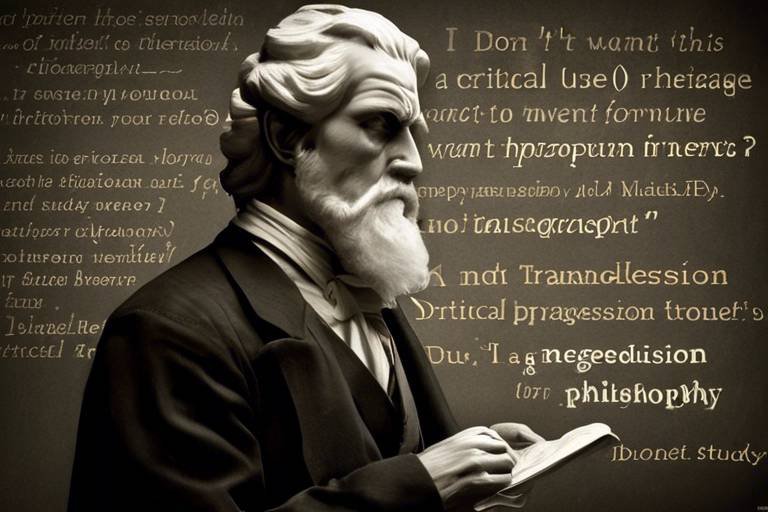Can Theism and Atheism Find Common Ground?
The age-old debate between theism and atheism often feels like a battleground, with each side firmly entrenched in their beliefs. But what if we took a step back and asked ourselves: can these two seemingly opposing perspectives find common ground? The answer may surprise you. While the core beliefs of theists and atheists differ significantly, there are underlying threads of humanity that connect us all. By exploring the philosophical, ethical, and social dimensions of both viewpoints, we can uncover areas of dialogue and understanding that may foster unity rather than division.
At first glance, it might seem impossible to reconcile the belief in a divine being with the absence of belief in one. However, when we delve deeper, we discover that both theists and atheists grapple with similar questions about existence, morality, and the human experience. Imagine two travelers on different paths, each seeking the same destination. They may have different routes, but their ultimate goal is the same: to understand their place in the universe and to find meaning in their lives.
In this article, we will explore how the philosophical foundations of theism and atheism shape their respective worldviews, how each perspective approaches ethics and morality, and the social implications of their interactions. By examining these dimensions, we can begin to identify potential areas of commonality and collaboration. After all, despite our differences, we are all part of the same human family, sharing this planet and facing similar challenges.
So, let's embark on this journey together and see if theism and atheism can indeed find common ground. Are you ready to explore the possibilities?

Philosophical Foundations
This article explores the potential for dialogue and understanding between theistic and atheistic perspectives, examining philosophical, ethical, and social dimensions that may foster common ground despite fundamental differences.
The philosophical foundations of theism and atheism are deeply rooted in their respective worldviews, shaping how adherents perceive reality and existence. At the core of theism lies the belief in a divine being or beings, which provides a framework for understanding the universe and our place within it. Theists often argue that a higher power is essential for explaining the origins of the cosmos, the complexity of life, and the moral order of the universe. They may invoke arguments such as the cosmological argument, which posits that everything that exists has a cause, ultimately leading back to a first cause, often identified as God.
On the other hand, atheism challenges these notions, asserting that the universe can be understood through naturalistic explanations without invoking the supernatural. Atheists often rely on scientific inquiry and empirical evidence to explain phenomena traditionally attributed to divine intervention. For instance, the Big Bang theory and the theory of evolution provide robust frameworks for understanding the origins of the universe and the diversity of life, respectively. This reliance on reason and evidence forms the basis of the atheistic worldview, leading to a fundamental skepticism towards theistic claims.
Both perspectives engage in a rich tapestry of philosophical discourse, often grappling with profound questions about existence, morality, and the nature of truth. Key arguments that shape these worldviews include:
- The Problem of Evil: This argument questions how a benevolent and omnipotent God can allow suffering and evil in the world. Theists often respond with the concept of free will, suggesting that human choices lead to moral failures, while atheists may argue that the existence of such suffering undermines the credibility of theistic claims.
- Faith vs. Reason: Theism frequently emphasizes faith as a means of understanding the divine, while atheism prioritizes reason and critical thinking. This dichotomy raises important questions about the validity of belief systems and the role of evidence in shaping our understanding of reality.
Moreover, the debate extends to the nature of truth itself. Theists may assert that truth is absolute and grounded in divine revelation, while atheists typically advocate for a more relativistic approach, suggesting that truth is contingent upon human experience and understanding. This divergence leads to contrasting views on knowledge, ethics, and the human condition, creating a fertile ground for philosophical exploration and dialogue.
In summary, the philosophical foundations of theism and atheism are complex and multifaceted. While they may appear irreconcilable at first glance, exploring their arguments and counterarguments reveals a shared human desire to seek understanding and meaning in an often chaotic world. By engaging in open dialogue, both sides can potentially uncover commonalities that foster mutual respect and understanding.
1. Can theism and atheism coexist peacefully?
Yes, many individuals from both perspectives engage in constructive dialogue and coexistence, focusing on shared values rather than differences.
2. How do theists justify the existence of evil?
Theists often argue that free will allows for moral choices, which can lead to evil actions, but this does not negate the existence of a benevolent God.
3. What role does science play in atheism?
Atheism often relies on scientific explanations for understanding the universe, emphasizing empirical evidence and rational inquiry over supernatural beliefs.
4. Are there ethical frameworks that both theists and atheists can agree on?
Yes, both perspectives can find common ground in ethical principles such as compassion, justice, and the importance of human rights, despite differing motivations.

Ethical Considerations
The discussion around ethics often serves as a bridge between theistic and atheistic perspectives, revealing how both worldviews approach the fundamental questions of morality, justice, and human rights. While the foundations of these ethical frameworks may differ significantly, the outcomes can sometimes converge in surprising ways. This exploration of ethical considerations invites us to ponder: can the essence of morality exist independently of divine authority? Or is it an intrinsic part of human experience that transcends religious boundaries?
In the realm of theism, morality is frequently viewed through the lens of divine command. Theistic beliefs assert that moral values are grounded in the will of a higher power, often articulated through sacred texts and religious traditions. For example, many adherents of theistic traditions might argue that their understanding of right and wrong is heavily influenced by their faith. This perspective gives rise to what is known as Divine Command Theory, which posits that moral obligations stem from God's directives. However, this theory raises intriguing questions: if morality is solely derived from divine authority, can it truly be deemed universal? What happens when individuals encounter moral dilemmas that challenge religious teachings?
Divine Command Theory suggests that actions are morally right if they align with God's commands. However, this raises a critical question about the nature of morality itself. If moral values are dictated by a divine being, does it imply that morality is arbitrary, dependent on the whims of that deity? This leads to the famous Euthyphro dilemma: is something good because God commands it, or does God command it because it is good? Such philosophical inquiries not only challenge theistic moral frameworks but also invite atheists to consider the nature of morality without divine influence.
Moreover, religious ethics often emphasize community values and teachings, showcasing how theistic frameworks shape moral behavior and decision-making within societies. For instance, in many religious communities, ethical guidelines are derived from collective interpretations of sacred texts, which serve as a moral compass for followers. This communal aspect of morality can foster a strong sense of belonging and shared purpose, yet it can also lead to exclusionary practices against those who do not share the same beliefs. Thus, while theistic ethics may provide a robust framework for many, it is essential to recognize the potential for ethical pluralism in a diverse society.
On the flip side, atheistic perspectives advocate for secular ethics, where morality is rooted in human reason and experience rather than divine authority. Atheists often argue that ethical behavior can be derived from empathy, social contracts, and a shared understanding of human rights. This perspective encourages individuals to engage with moral questions through critical thinking and rational discourse. It poses the idea that morality is not a fixed set of rules handed down by a deity, but rather a dynamic, evolving construct shaped by human interactions and societal progress.
Atheists may draw from various philosophical traditions, such as utilitarianism or humanism, to articulate their ethical beliefs. For instance, utilitarianism focuses on the consequences of actions, advocating for those that maximize overall happiness and minimize suffering. This pragmatic approach to ethics resonates with many, as it emphasizes the importance of outcomes over adherence to a prescribed set of rules. In this way, atheistic morality can reflect a commitment to social justice and the well-being of all individuals, regardless of their beliefs.
Ultimately, the ethical considerations stemming from both theism and atheism highlight a shared human concern for morality. While the foundational beliefs may diverge, the quest for justice and ethical living is a common thread that unites individuals across the spectrum of belief. By engaging in open dialogue and exploring these ethical frameworks, both theistic and atheistic communities can find common ground, fostering collaboration on pressing societal issues.
- Can theistic and atheistic individuals work together on social issues? Yes, many individuals from both perspectives collaborate on various social issues, emphasizing shared goals over differing beliefs.
- What are some common ethical principles shared by theism and atheism? Both perspectives often value principles like justice, empathy, and the well-being of individuals, despite differing motivations.
- How can interfaith dialogue improve understanding between theistic and atheistic communities? Interfaith dialogue encourages respectful conversations, allowing individuals to share their beliefs and learn from one another.

Morality in Theism
Theistic beliefs often assert that morality is grounded in divine command, which creates a unique understanding of right and wrong that is heavily influenced by religious texts and traditions. For many believers, the idea that a higher power dictates what is moral provides a clear framework for ethical decision-making. This divine command theory posits that moral obligations stem directly from God's will, suggesting that what is deemed 'good' is inherently tied to divine approval. But does this mean that morality is only valid when it is connected to a deity? This question invites a deeper exploration into the nature of morality itself.
One of the key aspects of theistic morality is the reliance on religious texts, such as the Bible, Quran, or Torah, which provide guidelines on how to live a virtuous life. These texts often contain stories and teachings that illustrate moral principles, encouraging followers to reflect on their actions and the consequences thereof. For instance, the Ten Commandments serve as a foundational ethical code for many Judeo-Christian believers, outlining essential behaviors that are deemed acceptable and those that are not.
Moreover, theistic ethics emphasizes the importance of community values and teachings. In many religious traditions, the moral framework is not just an individual pursuit but a collective one. Community gatherings, sermons, and religious education play a crucial role in shaping the moral compass of believers. This communal aspect fosters a sense of belonging and shared responsibility, as individuals are encouraged to uphold the values of their faith not just for personal benefit but for the welfare of the community. For example:
- Compassion: Many religions preach compassion as a moral imperative, urging followers to help those in need.
- Forgiveness: The act of forgiving others is often seen as a divine command, promoting reconciliation and healing within communities.
- Charity: Almsgiving and acts of charity are emphasized in various theistic traditions, reinforcing the idea that moral actions should benefit others.
However, the divine command theory raises significant questions about the nature of morality independent of divine authority. If moral values are solely dictated by God, can they be considered universal? Or are they merely reflections of the cultural and historical contexts in which they were revealed? This debate leads to further discussions on whether morality can exist outside of a religious framework, challenging theistic perspectives to defend their views against secular moral philosophies.
In conclusion, while theistic morality is deeply rooted in divine command and religious teachings, it opens the door to complex discussions about the nature of ethics. The interplay between community values, religious texts, and individual beliefs creates a rich tapestry of moral understanding that is both profound and sometimes contentious. As believers navigate their ethical landscapes, they may find that their moral convictions not only guide their actions but also invite dialogue with those who hold different views, including atheists, creating a space for mutual exploration of what it means to be moral in a diverse world.

Divine Command Theory
The is a fascinating and often debated concept in the realm of ethics, particularly within theistic frameworks. It posits that moral obligations are fundamentally derived from the commands of God. This theory suggests that what is considered "right" or "wrong" is not inherently understood by humans but is dictated by divine will. Imagine a world where morality is akin to a game of follow-the-leader, with God as the ultimate leader whose rules dictate the course of ethical behavior. This perspective can lead to some intriguing discussions about the nature of morality itself.
One of the central questions raised by Divine Command Theory is: can morality exist independently of God's commands? If all moral values are contingent upon divine will, then what happens when individuals attempt to reason about ethics without invoking a deity? This dilemma opens up a rich dialogue about the foundations of morality and the implications of divine authority. For instance, if a person believes that an action is morally wrong because God has prohibited it, how does that differ from someone who believes the same action is wrong based on human empathy or societal norms?
Furthermore, the Divine Command Theory raises significant questions about the nature of God. If God commands something that appears to be morally questionable, such as violence or discrimination, does that action become morally acceptable simply because it is commanded? This line of questioning leads to a deeper exploration of the character of God and the attributes that define divine goodness. It challenges believers to reconcile their understanding of a loving and just God with the moral implications of divine commands.
To illustrate the complexities of Divine Command Theory, consider the following table that outlines key arguments for and against this ethical framework:
| Arguments For | Arguments Against |
|---|---|
| Provides a clear source of moral authority. | Raises questions about morality's independence from divine will. |
| Encourages adherence to a consistent moral code. | Can lead to justifying morally questionable actions. |
| Offers a sense of purpose and meaning in ethical decision-making. | May discourage critical thinking about moral issues. |
In conclusion, the Divine Command Theory presents a compelling view of how theistic beliefs shape our understanding of morality. While it offers a framework for moral decision-making rooted in divine authority, it also invites critical examination of the nature of ethics and the character of the divine. As we navigate the complexities of morality, this theory encourages both believers and non-believers to engage in meaningful discussions about the foundations of their ethical beliefs.

Religious Ethics
When we dive into the realm of , we uncover a rich tapestry woven from centuries of beliefs, traditions, and community values. At its core, religious ethics serves as a guiding compass for the followers of various faiths, helping them navigate the often murky waters of moral decision-making. This framework is not just a collection of rules; it embodies the essence of how communities interpret right and wrong in the light of their sacred texts and teachings.
One of the most fascinating aspects of religious ethics is how it shapes the moral landscape of societies. For instance, consider the role of sacred texts. In many religions, these texts are viewed as divinely inspired, providing followers with explicit instructions on how to live a good life. For example, the Bible in Christianity, the Quran in Islam, and the Vedas in Hinduism all contain ethical guidelines that inform the behavior of their adherents. These texts often emphasize virtues such as compassion, honesty, and justice, creating a moral framework that is deeply embedded in the cultural identity of the community.
Moreover, religious ethics often emphasizes the importance of community. Many faith traditions advocate for a collective approach to morality, where the well-being of the community is prioritized over individual desires. This communal aspect can foster a sense of belonging and accountability among members, encouraging them to uphold ethical standards not just for themselves but for the greater good. For instance, in many religious communities, acts of charity and service to others are not merely encouraged; they are seen as moral imperatives.
However, the reliance on divine authority raises interesting questions. Can morality exist independently of religious beliefs? Some argue that ethical principles derived from religious texts can sometimes conflict with contemporary societal values. For instance, issues such as gender equality and LGBTQ+ rights often spark debates within religious communities, highlighting the tension between traditional teachings and modern understandings of justice and human rights.
To illustrate the impact of religious ethics on moral decision-making, let’s take a closer look at how different faiths approach a common ethical dilemma: the question of lying. In many religious traditions, honesty is a core value. However, the justification for lying can differ significantly:
| Religion | View on Lying |
|---|---|
| Christianity | Generally prohibits lying, but may allow for deception to protect innocent lives (e.g., Rahab in the Bible). |
| Islam | Honesty is paramount, but some scholars allow for lying in specific situations, such as to reconcile between people. |
| Judaism | Values truth, but recognizes that sometimes protecting someone’s feelings may justify a lie. |
This table illustrates how even a seemingly straightforward ethical issue can be interpreted differently across various religious traditions. Each perspective is shaped by a combination of scriptural teachings and cultural context, leading to a rich dialogue about morality that transcends individual beliefs.
In conclusion, religious ethics plays a crucial role in shaping the moral compass of individuals and communities alike. While it provides a structured approach to ethical dilemmas, it also invites ongoing discussions about the nature of morality, the influence of culture, and the importance of adapting ethical frameworks to meet the needs of contemporary society. As we continue to explore the intersection of theism and atheism, understanding these ethical foundations can pave the way for meaningful dialogue and collaboration.
- What is religious ethics? Religious ethics refers to the moral principles and values that are derived from religious teachings and texts, guiding the behavior of adherents.
- How do different religions approach morality? Different religions have unique teachings that influence their followers' understanding of morality, often leading to varied interpretations of ethical dilemmas.
- Can morality exist without religion? Yes, many atheists and secular humanists advocate for ethical frameworks based on reason and human experience, demonstrating that morality can be independent of religious beliefs.
- What role does community play in religious ethics? Community is often central to religious ethics, as many faith traditions emphasize collective well-being and accountability in moral decision-making.

Morality in Atheism
When we dive into the realm of atheism, we often find a rich tapestry of moral thought that is not tethered to the divine. Atheists typically advocate for a framework of morality that is rooted in human reason and experience, rather than in religious doctrine. This secular approach to ethics invites us to consider questions of right and wrong through the lens of human well-being and social harmony. Imagine a world where moral decisions are made based on the collective experience of humanity, rather than ancient texts; this is the essence of atheistic morality.
Atheists argue that morality can emerge from our innate sense of empathy and the social contracts we form within our communities. The understanding of what is right or wrong is often shaped by the consequences of our actions on others, promoting a sense of responsibility that transcends religious boundaries. For instance, the Golden Rule, which suggests treating others as one would like to be treated, is a principle that resonates with both atheistic and theistic perspectives. This commonality highlights that morality is not solely the province of religion; it can be cultivated through shared human experiences.
Moreover, atheistic morality emphasizes the importance of critical thinking and rational discourse. Atheists often engage in ethical discussions that prioritize evidence and reasoning over faith-based assertions. This approach allows for a dynamic understanding of morality that can adapt to new information and changing societal norms. For example, consider how contemporary debates around issues like climate change and social justice are informed by scientific understanding and ethical reasoning, rather than by religious texts. In this sense, atheism offers a flexible moral framework that can evolve with society.
To further illustrate the atheistic perspective on morality, we can explore a few key principles:
- Empathy and Compassion: At the heart of atheistic morality lies the capacity for empathy. Understanding and sharing the feelings of others fosters a sense of community and ethical responsibility.
- Consequentialism: Atheists often adopt a consequentialist view, assessing the morality of an action based on its outcomes. This means that actions are judged by their impact on human well-being and societal welfare.
- Secular Humanism: Many atheists align with secular humanism, which advocates for human rights and dignity as foundational ethical principles, independent of religious belief.
In summary, while atheism may lack a divine command to dictate moral behavior, it offers a robust framework for understanding ethics through human experience and reason. By focusing on empathy, critical thinking, and the consequences of our actions, atheists contribute to a rich dialogue about morality that can coexist with theistic perspectives. The discussion around morality in atheism not only challenges traditional views but also emphasizes the potential for collaboration in addressing the ethical dilemmas that face humanity today.
Q: Can atheists be moral without religion?
A: Absolutely! Atheists often base their moral principles on human empathy, reason, and the consequences of actions, not on religious teachings.
Q: How do atheists determine what is right or wrong?
A: Atheists typically use critical thinking, societal norms, and the impact of their actions on others to guide their moral decisions.
Q: Is there a common moral ground between atheists and theists?
A: Yes, many moral principles, such as the Golden Rule, are shared across both perspectives, demonstrating that ethical concerns can transcend religious boundaries.

Social Implications
The relationship between theism and atheism is not just a matter of personal belief; it has profound social implications that shape our communities, political landscapes, and interfaith relations. In a world where diversity of thought is more prominent than ever, understanding how these two perspectives interact can lead to a more harmonious society. The interplay of theistic and atheistic views influences various aspects of life, from community dynamics to legislative policies. For instance, consider how debates around religious freedom and secularism often emerge in public discourse. These discussions are not merely academic; they affect the lives of individuals and communities, shaping everything from education systems to healthcare policies.
Furthermore, the growing trend of interfaith dialogue illustrates the potential for collaboration between theistic and atheistic individuals. These dialogues provide a platform for people to share their beliefs, fostering mutual respect and understanding. In such settings, participants often find common ground on issues like social justice, environmental conservation, and human rights. Despite their differences, both theists and atheists can unite around shared values and goals. This is particularly evident in community service initiatives, where individuals from both backgrounds come together to address pressing societal issues.
Interestingly, the evolving role of atheism in contemporary society is prompting discussions about how secularism can coexist with religious beliefs. As more people identify as atheists or non-religious, the challenge lies in creating a society where diverse worldviews can thrive. This shift is not just about the absence of belief in a deity; it also encompasses a broader understanding of human rights and dignity. For example, many atheists advocate for policies that promote equality and justice, aligning closely with the ethical teachings found in various religious traditions. In this way, the social implications of theism and atheism are not just about conflict; they also present opportunities for collaboration and growth.
As we navigate these complex social landscapes, it’s essential to address the challenges both theism and atheism face. Issues such as poverty, inequality, and environmental degradation are not confined to one belief system. Instead, they are universal challenges that require a collective response. By focusing on these shared societal concerns, both theists and atheists can work together to create a more just and equitable world.
- What is the main difference between theism and atheism?
Theism is the belief in one or more deities, while atheism is the absence of belief in any deity. - Can theists and atheists have meaningful conversations?
Yes, interfaith dialogue and discussions can lead to mutual understanding and respect between both groups. - What are some common social issues both groups can address together?
Both theists and atheists can collaborate on issues like poverty, inequality, and environmental concerns.

Interfaith Dialogue
Interfaith dialogue serves as a vital bridge between theistic and atheistic perspectives, fostering an environment where individuals can engage in meaningful conversations. Imagine a vibrant marketplace where ideas are exchanged as freely as goods; this is what interfaith dialogue aims to create. It provides a platform for individuals from diverse backgrounds to come together, share their beliefs, and find commonalities that transcend their differences. In a world often polarized by conflicting ideologies, this dialogue becomes not just necessary but essential.
One of the most significant benefits of interfaith dialogue is the opportunity it presents for mutual respect. When people sit down to discuss their beliefs, they often discover that, while their conclusions may differ, the underlying questions and concerns can be remarkably similar. For instance, both theists and atheists grapple with profound questions about existence, morality, and purpose. This shared quest for understanding can lead to a deeper appreciation of each other's viewpoints, creating a sense of camaraderie that might not have existed otherwise.
Moreover, interfaith dialogue can take various forms, ranging from formal discussions and panels to casual meetups and community events. Each format allows for a different level of engagement, but the goal remains the same: to foster understanding and collaboration. For example, a panel discussion might involve representatives from different faiths and secular beliefs presenting their views on a particular topic, followed by a Q&A session. This not only educates the audience but also encourages participants to think critically about their beliefs and how they relate to others.
In addition to fostering understanding, interfaith dialogue can also lead to collaborative efforts on social issues. When individuals from different belief systems unite for a common cause, such as addressing poverty or environmental concerns, they can pool their resources and ideas, creating a more significant impact. This collaboration showcases the power of diverse perspectives working together towards a shared goal, demonstrating that our differences can indeed be our strengths.
However, initiating interfaith dialogue is not without its challenges. Misunderstandings and prejudices can create barriers that make open communication difficult. To overcome these hurdles, it is crucial to approach these discussions with an open mind and a willingness to listen. Participants must be prepared to engage in respectful discourse, even when faced with opposing views. In this way, interfaith dialogue can serve as a catalyst for personal growth and societal change, encouraging individuals to step outside their comfort zones and embrace the richness that diversity offers.
In conclusion, interfaith dialogue is more than just a conversation; it is a powerful tool for building bridges between theistic and atheistic communities. By fostering mutual respect, encouraging collaboration, and addressing challenges head-on, we can create a more inclusive society where diverse beliefs coexist peacefully. The journey may be complex, but the rewards of understanding and cooperation are well worth the effort.
- What is the purpose of interfaith dialogue?
The purpose of interfaith dialogue is to foster understanding, respect, and collaboration between individuals of different faiths and beliefs, allowing them to share their perspectives and find common ground.
- How can one participate in interfaith dialogue?
Individuals can participate in interfaith dialogue by attending community events, joining discussion groups, or engaging in online forums that promote respectful conversations about faith and beliefs.
- What are the benefits of interfaith dialogue?
Benefits include increased mutual respect, enhanced understanding of different perspectives, collaboration on social issues, and personal growth through exposure to diverse ideas.

Atheism in Society
Atheism, once viewed as a fringe belief, has increasingly gained traction in contemporary society. This shift is not just a matter of personal belief; it has profound implications for how communities interact, how politics are shaped, and how we understand our place in the world. Have you ever wondered how atheism influences social norms and values? It’s fascinating to see how a worldview that rejects the divine can still foster a strong sense of community and ethics.
One significant aspect of atheism in society is its relationship with secularism. Secularism advocates for the separation of religion from civic affairs and government, promoting a landscape where individuals can freely express their beliefs—whether theistic or atheistic—without fear of discrimination. This has led to a more pluralistic society where diverse perspectives can coexist. For instance, in countries like Sweden and Denmark, high levels of secularism have resulted in strong social welfare systems, which many attribute to a collective sense of responsibility that transcends religious boundaries.
Moreover, the rise of atheism has prompted discussions about religious freedom. In many parts of the world, atheists face stigma or outright persecution. However, as more people openly identify as atheists, advocacy for their rights has grown. Organizations dedicated to promoting secular values and defending the rights of non-believers have emerged, creating a platform for dialogue. This leads to a crucial question: can a society that respects atheism also honor the beliefs of the religious? The answer lies in fostering mutual respect and understanding.
In addition to these societal implications, the presence of atheism has also influenced discussions on morality. Contrary to the belief that morality is exclusively derived from religious teachings, many atheists argue that ethics can be grounded in human reason and empathy. This perspective emphasizes a moral framework that is adaptable, based on the changing needs of society rather than fixed religious doctrines. Atheists often advocate for a morality that prioritizes human welfare, justice, and equality. It’s intriguing to consider how these ethical viewpoints can align with theistic beliefs, creating a rich tapestry of moral thought.
Furthermore, the visibility of atheism has led to a cultural shift in how society perceives non-belief. Atheists are increasingly represented in various fields, including politics, science, and the arts. This representation challenges stereotypes and encourages open conversations about belief systems. For example, prominent public figures who identify as atheists are paving the way for others to express their views without fear of backlash. This visibility is crucial in normalizing atheism and integrating it into the broader societal narrative.
In conclusion, the evolution of atheism in society is a testament to the changing landscape of belief systems. It raises essential questions about coexistence, ethics, and community. As we continue to navigate these complexities, it becomes clear that atheism is not merely a rejection of the divine but a rich perspective that contributes to the ongoing dialogue about what it means to be human. So, what does this mean for the future? The potential for collaboration between theistic and atheistic individuals in addressing shared societal issues is immense, and it’s an exciting time to be part of this conversation.
- What is atheism? Atheism is the absence of belief in the existence of deities or gods.
- How does atheism affect social dynamics? Atheism promotes secularism and can lead to more inclusive discussions about ethics and community values.
- Can atheists have a moral framework? Yes, many atheists advocate for morality based on human reason, empathy, and the well-being of society.
- What challenges do atheists face in society? Atheists may encounter stigma, discrimination, or persecution, especially in highly religious societies.

Common Challenges
Both theistic and atheistic perspectives grapple with a myriad of existential questions that challenge the very fabric of human understanding. Questions about purpose, existence, and the nature of reality are not exclusive to one belief system; instead, they resonate deeply within the hearts and minds of individuals across the spectrum. Have you ever pondered why we are here? What is our purpose in this vast universe? These are not merely philosophical musings but rather profound inquiries that unite us all, prompting dialogue that can bridge the gap between theism and atheism.
Moreover, societal issues such as poverty, inequality, and environmental degradation present common challenges that can inspire collaboration. Both theists and atheists can find common ground in their desire to address these pressing concerns, despite their differing motivations. For instance, a theist may feel compelled to help the less fortunate due to divine command, while an atheist may advocate for social justice based on a secular understanding of human rights. This shared commitment to making the world a better place can foster partnerships that transcend ideological boundaries.
In fact, the intersection of these challenges often reveals surprising similarities in how both groups approach problem-solving. Consider the various initiatives aimed at combating climate change. Both theistic organizations and secular groups have come together to advocate for sustainable practices, recognizing that the health of our planet is a shared responsibility. Such collaborations not only highlight the potential for unity but also challenge the notion that differing beliefs must lead to division. Instead, they can serve as a catalyst for change, encouraging individuals to focus on what truly matters: the well-being of humanity and the world we inhabit.
However, it's essential to acknowledge that both perspectives face unique challenges in these endeavors. Theists may struggle with reconciling their faith with scientific findings, while atheists might encounter skepticism about their moral frameworks. Yet, these challenges can serve as opportunities for growth and understanding. By engaging in open conversations and actively listening to each other's experiences, both sides can cultivate a deeper appreciation for their respective viewpoints. This dialogue can lead to innovative solutions that reflect a blend of ethical considerations from both theistic and atheistic perspectives, ultimately enriching the discourse.
In conclusion, the common challenges faced by theism and atheism—ranging from existential inquiries to societal issues—provide a fertile ground for collaboration. By recognizing shared goals and fostering respectful dialogues, both groups can work together to address the pressing concerns of our time. After all, at the heart of these challenges lies a fundamental truth: we are all human beings striving for meaning, purpose, and a better future.
- Can theism and atheism coexist peacefully?
Yes, through mutual respect and understanding, both perspectives can coexist and even collaborate on common goals. - What are some common goals that theists and atheists can work on together?
Issues like poverty alleviation, environmental protection, and social justice are areas where both can unite. - How can dialogue between theistic and atheistic individuals be initiated?
Open forums, community service projects, and interfaith dialogues are excellent starting points for meaningful conversations.

Existential Questions
This article explores the potential for dialogue and understanding between theistic and atheistic perspectives, examining philosophical, ethical, and social dimensions that may foster common ground despite fundamental differences.
This section delves into the philosophical underpinnings of both theism and atheism, highlighting key arguments and counterarguments that shape their respective worldviews.
Examining the ethical frameworks of theism and atheism reveals how both perspectives approach morality, justice, and human rights, often leading to surprising similarities.
Theistic beliefs often assert that morality is grounded in divine command, leading to a unique understanding of right and wrong influenced by religious texts and traditions.
This theory posits that moral obligations are derived from God's will, raising questions about the nature of morality independent of divine authority.
Religious ethics emphasizes community values and teachings, illustrating how theistic frameworks shape moral behavior and decision-making within societies.
Atheistic perspectives often advocate for secular ethics, where morality is based on human reason and experience rather than divine authority, promoting a different understanding of ethical behavior.
The interplay between theism and atheism has significant social implications, influencing community dynamics, political discourse, and interfaith relations in diverse societies.
Interfaith dialogue serves as a platform for theistic and atheistic individuals to engage in meaningful conversations, fostering mutual respect and understanding.
The role of atheism in contemporary society is evolving, prompting discussions on secularism, religious freedom, and the coexistence of diverse worldviews.
Both theism and atheism face challenges in addressing existential questions, societal issues, and the search for meaning, creating opportunities for collaboration.
When we dive into the realm of , we find ourselves at the crossroads of theistic and atheistic thought. These questions, which probe the very essence of existence, purpose, and the human condition, resonate deeply with both believers and non-believers alike. Have you ever pondered why we are here? Or what our ultimate purpose might be? These inquiries are not confined to any single belief system; rather, they reflect a universal human experience.
At the heart of existential questioning lies a shared curiosity about life's meaning. Theists often find answers through the lens of divine purpose, believing that a higher power has a specific plan for each individual. In contrast, atheists may approach these questions through a secular perspective, suggesting that meaning is not inherent but rather constructed through personal experiences and relationships.
Despite their differing foundations, both groups grapple with similar themes:
- Purpose: What drives us to seek fulfillment in our lives?
- Identity: How do we define ourselves in a world filled with diverse beliefs?
- Legacy: What impact do we wish to leave behind for future generations?
These shared concerns provide fertile ground for dialogue. Imagine a world where theistic and atheistic individuals come together not to argue over their differences but to explore these profound questions collaboratively. Such discussions can lead to a richer understanding of our shared humanity, fostering empathy and respect.
Moreover, the quest for answers to existential questions often reveals our vulnerabilities. Both theists and atheists may experience moments of doubt, fear, and uncertainty. Recognizing these common struggles can bridge the gap between the two perspectives, allowing for a conversation that transcends mere ideology.
- Can theism and atheism truly coexist? Yes, many individuals from both perspectives engage in respectful dialogue and find common ground on various issues.
- What are some shared values between theism and atheism? Both groups often value compassion, justice, and the pursuit of knowledge, despite differing motivations.
- How can interfaith dialogue be beneficial? It fosters understanding, respect, and collaboration on social issues, allowing both sides to learn from one another.

Societal Issues
When we think about the challenges facing society today, it’s clear that both theism and atheism have a stake in the game. Issues like poverty, inequality, and environmental degradation are not just abstract concepts; they affect real lives and communities. Interestingly, these pressing societal issues can serve as a bridge for dialogue between theistic and atheistic perspectives, allowing individuals from both sides to come together for a common cause. Imagine two groups standing on opposite sides of a river, each with their own beliefs and values. The river represents the societal challenges we face, and the bridge we build to cross it is our shared commitment to improving the world.
For instance, when it comes to poverty, both theists and atheists often share a fundamental belief in the importance of helping those in need. Theistic traditions frequently emphasize charity and compassion, rooted in religious teachings that advocate for caring for the less fortunate. On the other hand, atheists may approach this issue from a humanitarian perspective, advocating for social justice and equality based on ethical reasoning and empirical evidence. This convergence of values presents a unique opportunity for collaboration. By focusing on the shared goal of alleviating poverty, both groups can pool their resources, ideas, and energy to create a more equitable society.
Similarly, the issue of environmental sustainability can unite theistic and atheistic individuals. Many religious traditions teach stewardship of the Earth, promoting the idea that humans have a responsibility to care for creation. Conversely, atheists often advocate for environmental protection based on scientific understanding and the moral imperative to preserve the planet for future generations. This mutual concern for the environment can lead to joint initiatives aimed at addressing climate change, promoting renewable energy, and advocating for policies that protect our natural resources.
However, it’s essential to recognize that while common ground exists, the motivations driving these two perspectives can differ significantly. Theists may view their efforts as a divine mandate, while atheists may see it as a moral obligation grounded in humanistic principles. Understanding these differences can enrich discussions and foster deeper connections, as each side learns from the other’s viewpoints. In many ways, this dialogue resembles a dance—each partner brings their unique style and rhythm, creating a beautiful performance when they move in harmony.
Ultimately, the challenges of society are vast and complex, but they also present a golden opportunity for theists and atheists to unite. By focusing on shared goals and values, both groups can work together to address the pressing issues of our time. Whether it’s through community service, advocacy, or simply engaging in respectful conversations, the potential for collaboration is immense. The journey may not always be easy, but the rewards of working together for a better society can be profound, paving the way for a more inclusive and compassionate world.
- Can theism and atheism truly work together on societal issues?
Yes, both groups can find common ground on various societal issues, such as poverty and environmental sustainability, by focusing on shared goals and values.
- What are some examples of collaboration between theistic and atheistic individuals?
Collaborative efforts can include joint community service projects, advocacy for social justice, and environmental initiatives that benefit society as a whole.
- How can dialogue between theism and atheism be encouraged?
Encouraging open and respectful conversations, hosting interfaith dialogues, and fostering environments that promote understanding can help bridge the gap.
Frequently Asked Questions
- Can theism and atheism really find common ground?
Absolutely! While theistic and atheistic perspectives may seem worlds apart, there are numerous philosophical, ethical, and social dimensions where dialogue can thrive. By focusing on shared human experiences and values, both sides can engage in meaningful conversations that foster understanding.
- What are the philosophical foundations of theism and atheism?
Theism is generally rooted in the belief in a divine being or beings that influence the universe, while atheism typically rejects this notion, relying instead on reason and empirical evidence. Both perspectives have rich philosophical traditions, with theism often drawing from religious texts and traditions, and atheism from humanistic and scientific reasoning.
- How do theistic and atheistic views approach morality?
Theism often bases morality on divine command, suggesting that what is right and wrong comes from God’s will. In contrast, atheism promotes secular ethics, where moral principles are derived from human reason and societal consensus. Surprisingly, both approaches can lead to similar conclusions about justice and human rights.
- What role does interfaith dialogue play in bridging gaps?
Interfaith dialogue is crucial as it provides a platform for theistic and atheistic individuals to share their views and experiences. This engagement encourages mutual respect and understanding, helping to break down stereotypes and fostering a sense of community among diverse belief systems.
- What are some common challenges faced by both theism and atheism?
Both perspectives grapple with existential questions about purpose and meaning in life. Additionally, societal issues such as poverty, inequality, and environmental challenges can unite both theistic and atheistic individuals in their efforts to create positive change, despite their differing motivations.
- How can theistic and atheistic individuals work together on societal issues?
Collaboration is key! By focusing on shared goals, such as combating poverty or addressing climate change, both groups can combine their resources and perspectives. This partnership can be incredibly powerful, showcasing that despite differing beliefs, the desire for a better world is a common thread.



















